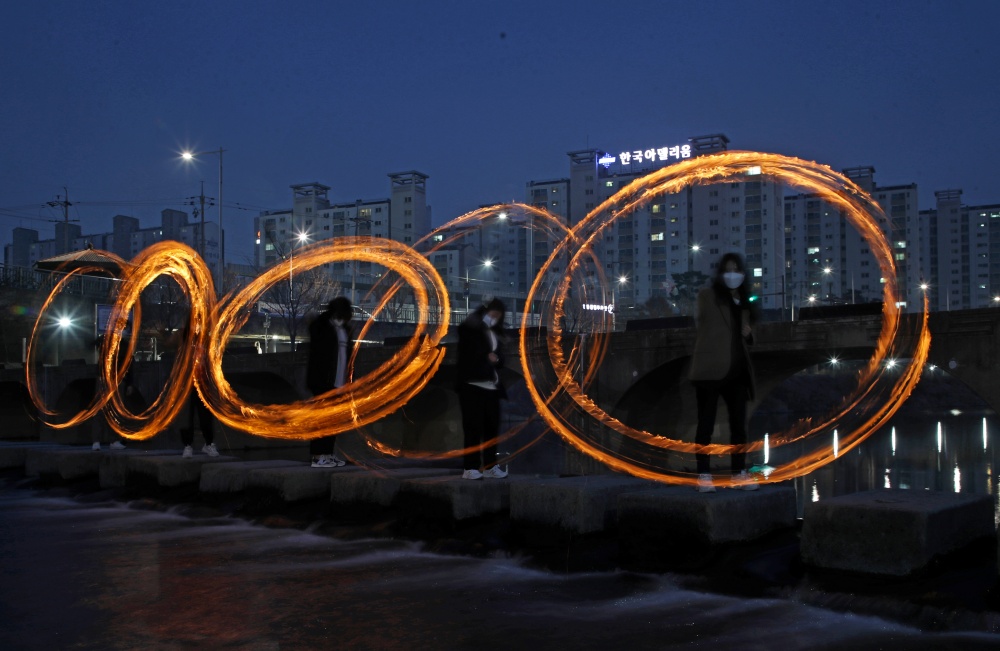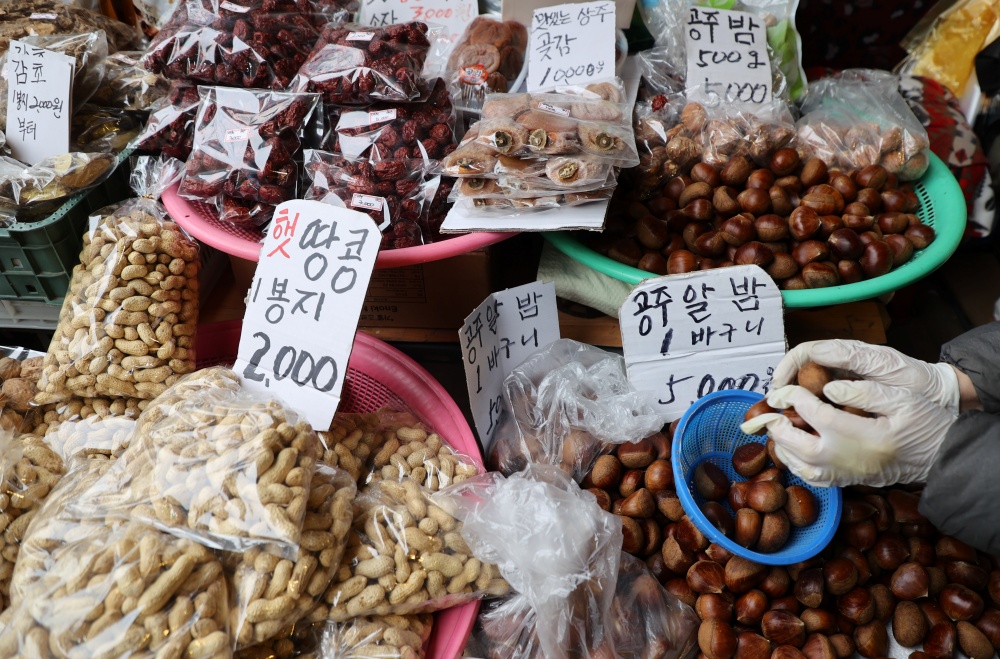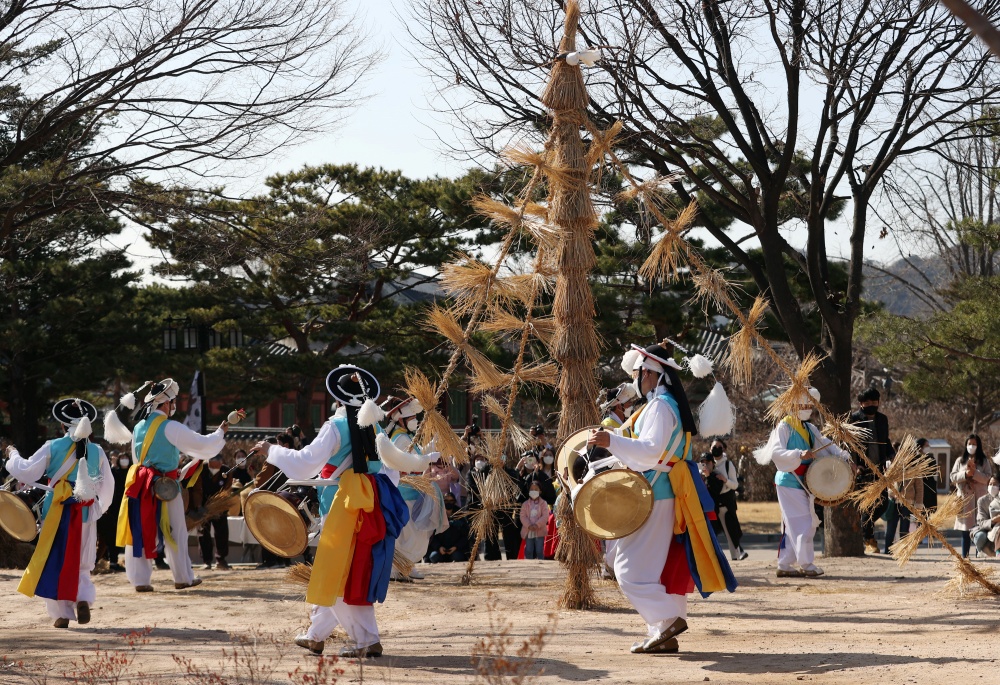
Jwibulnori, a game played when the year's first full moon appears under the lunar calendar, involves lighting or playing with fire on the banks of rice paddies and fields to prevent damage by harmful insects and wish for a prosperous year.
By Kim Hyelin
Photos = Yonhap News
Video = Arirang TV
Jan. 15 under the lunar calendar in Korea is Jeongwol Daeboreum, the day of the first full moon after Seollal (Lunar New Year) and a traditional occasion to pray for a good harvest and well-being for the year.
Koreans on this day traditionally drank gwibalgisul, an alcoholic drink whose name means "drink that sharpens the ears," and ate ogokbap (five-grain rice), namul (seasoned vegetables) and bureom (assortment of nuts). Villages celebrated seasonal customs such as byeotgaritdae (erecting a pole filled with bags of grain) and jisinbapgi, a rite performed to salute the god of the land who protects villager homes, to wish for a village's well-being and peace.
Jeongwol Daeboreum this year falls on Feb. 5, and many events to mark the occasion are scheduled nationwide. The easing of COVID-19 restrictions means that the festivities will be held offline for the first time in three years.
The National Folk Museum of Korea in Seoul's Jongno-gu District on Feb. 5 at 11 a.m. will showcase byeotgaritdae, the traditional community custom of wrapping up grains such as rice, barley, millet, sorghum, beans and red beans in straw or cloth and hanging them high on poles to pray for an abundant harvest in the year. Audiences can sample bureom at the museum lobby.
Namsangol Hanok Village in Seoul's Jung-gu District on the same day from 6 p.m. will hold a jisinbapgi performance, followed by a demonstration of daljip taeugi, a seasonal custom whose name literally means "burning the moon house," 30 minutes later.
Jisinbapgi is a ritual in which a pungmulpae (farmers' band) in a village travels from house to house, offering food with nongak (traditional music performed by farmers) to the god of the land who protects a house site to wish for the well-being of the family. Daljip taeugi involves torching a pile of pine branches to burn away bad luck and pray for a family's peace and happiness.

Bureomggaeki is the custom of eating hard nuts on the early morning of Jeongwol Daeboreum to pray for good health during the year.
An event to mark the lunar new year's first full moon will be held atop Gariwangsan Mountain, 1,381 m above sea level, in Jeongseon-gun County, Gangwon-do Province. For events to see the sunrise and moon, the Gariwangsan cable car will run from 6:30 a.m. The final boarding time from the mountain top will be extended to 8 p.m.
Yangyang-gun County in Gangwon-do on Feb. 4, the day before Jeongwol Daeboreum, will have daljip taeugi performances at Seorak Beach and Hujin Port.
At Haemieupseong, a fortress in the town of Haemi-eup in Seosan, Chungcheongnam-do Province, performances on Feb. 5 will include those of byeotgaritdae, jisinbapgi, minyo (folk songs) and pungmul (traditional percussive music and dance).
The 40th Gwangju Chilseok Gossaum Nori (Loop Fight of Gwangju) is slated from Feb. 4-5 at Gossaum Theme Park in Gwangju's Nam-gu District. Gossaum is a folk game of two teams that each use a go, a round structure of rice straw, to drive the other's to the ground. This game representing Jeongwol Daeboreum is intended to wish for a village's prosperity and well-being.
The village ritual dongje will be held at Hahoe Village, a UNESCO World Heritage Site in Andong, Gyeongsangbuk-do Province. After conducting jesa (ancestral rites) at important places in the town, an ogokbap sharing event and jisinbapgi will follow.

Jisinbapgi is a ritual in which a pungmulpae (farmers' band) in a village travels from house to house, offering food with nongak (traditional music performed by farmers) to the family god who takes care of a house, to wish for the well-being of the family.
In Busan on Jeongwol Daeboreum, events like daljip taeugi will take place at nine venues including the beaches of Haeundae and Gwangalli.
On Jeju Island, an event to observe the full moon on Feb. 5 from 6 p.m. will be held at Jeju Starlight World Park and Planetarium in Jeju City. Visitors can directly observe the full moon using an astronomical telescope and take pictures with their smartphones. A photo zone will also allow the taking of photos against the backdrop of a large moon balloon.
kimhyelin211@korea.kr